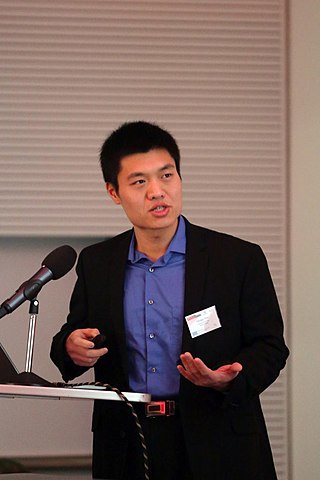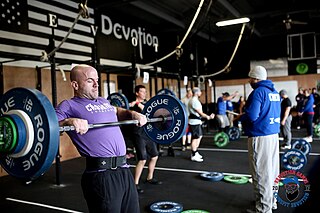Related Research Articles

The general term slag may be a by-product or co-product of smelting (pyrometallurgical) ores and recycled metals depending on the type of material being produced. Slag is mainly a mixture of metal oxides and silicon dioxide. Broadly, it can be classified as ferrous, ferroalloy or non-ferrous/base metals. Within these general categories, slags can be further categorized by their precursor and processing conditions. Slag generated from the EAF process can contain toxic metals, which can be hazardous to human and environmental health.
Carbonation is the chemical reaction of carbon dioxide to give carbonates, bicarbonates, and carbonic acid. In chemistry, the term is sometimes used in place of carboxylation, which refers to the formation of carboxylic acids.

Henry Samueli is an American businessman, engineer, and philanthropist. He is a co-founder of Broadcom Corporation, owner of the National Hockey League's Anaheim Ducks, and a prominent philanthropist in the Orange County, California community. He is chairman of Broadcom Inc. He is also a professor in the Electrical and Computer Engineering Department at UCLA, and a distinguished adjunct professor in the Electrical Engineering and Computer Science Department at UC Irvine.

Carbon sequestration is the process of storing carbon in a carbon pool. It plays a crucial role in limiting climate change by reducing the amount of carbon dioxide in the atmosphere. There are two main types of carbon sequestration: biologic and geologic.

Biological systems engineering or biosystems engineering is a broad-based engineering discipline with particular emphasis on non-medical biology. It can be thought of as a subset of the broader notion of biological engineering or bio-technology though not in the respects that pertain to biomedical engineering as biosystems engineering tends to focus less on medical applications than on agriculture, ecosystems, and food science. The discipline focuses broadly on environmentally sound and sustainable engineering solutions to meet societies' ecologically related needs. Biosystems engineering integrates the expertise of fundamental engineering fields with expertise from non-engineering disciplines.
The UCLA Henry Samueli School of Engineering and Applied Science, informally known as UCLA Samueli School of Engineering or UCLA Engineering, is the school of engineering at the University of California, Los Angeles (UCLA). It opened as the College of Engineering in 1945 and was renamed the School of Engineering in 1969. Since its initial enrollment of 379 students, the school has grown to approximately 6,500 students. The school offers 28 degree programs and is home to eight externally funded interdisciplinary research centers, including those in space exploration, wireless sensor systems, and nanotechnology.
Enhanced weathering, also termed ocean alkalinity enhancement when proposed for carbon credit systems, is a process that aims to accelerate the natural weathering by spreading finely ground silicate rock, such as basalt, onto surfaces which speeds up chemical reactions between rocks, water, and air. It also removes carbon dioxide from the atmosphere, permanently storing it in solid carbonate minerals or ocean alkalinity. The latter also slows ocean acidification.
Elmer L. Gaden Jr. has been described as "the father of biochemical engineering". A graduate of Columbia University, he wrote a dissertation that quantified the amount of oxygen necessary to fuel the fermentation process used to produce penicillin. Gaden established Columbia's program in biochemical engineering. He remained at Columbia for 26 years as a teacher, researcher, and department chair, before becoming dean of the college of engineering, mathematics, and business administration at the University of Vermont in 1974. In 1979, he joined the engineering faculty at the University of Virginia as the Wills Johnson Professor of Chemical Engineering. In 1994 he retired from Virginia, becoming Wills Johnson Professor Emeritus. He died in 2012.
Christopher W. Jones is an American chemical engineer and researcher of catalysis and carbon dioxide capture. In 2024 he is the John Brock III School Chair and Professor of Chemical & Biomolecular Engineering and adjunct professor of chemistry and biochemistry at the Georgia Institute of Technology, in Atlanta, Georgia. Previously he served as associate vice president for research at Georgia Tech (2013-2019), including a stint as interim executive vice-president for research in 2018.

Emily A. Carter is the Gerhard R. Andlinger Professor in Energy and the Environment and a professor of Mechanical and Aerospace Engineering (MAE), the Andlinger Center for Energy and the Environment (ACEE), and Applied and Computational Mathematics at Princeton University. She is also a member of the executive management team at the Princeton Plasma Physics Laboratory (PPPL), serving as Senior Strategic Advisor and Associate Laboratory Director for Applied Materials and Sustainability Sciences.
Camille Petit is a Reader in Materials Engineering at Imperial College London. She designs and characterises functional materials for environmental sustainability.

Direct air capture (DAC) is the use of chemical or physical processes to extract carbon dioxide directly from the ambient air. If the extracted CO2 is then sequestered in safe long-term storage (called direct air carbon capture and sequestration, the overall process will achieve carbon dioxide removal and be a "negative emissions technology".
David Glasser is a South African engineer best known for his co-development of attainable region theory and research into improving the efficiency of chemical processes. In 2001 he was the inaugural recipient of the Harry Oppenheimer Fellowship Award. He has also been awarded the Bill-Neale May Gold Medal by the South African Institute of Chemical Engineers, as well as the Science for Society Gold Medal from the Academy of Science of South Africa.

Praveen Linga PhD, a chemical engineer, is a professor at the National University of Singapore's Department of Chemical and Biomolecular Engineering. He is an expert in clathrate hydrates or gas hydrates. He is also the co-founder of NewGen Gas Pte Ltd, a spin-off company that specialises in solidified natural gas (SNG) technology via clathrate hydrates for natural gas storage and transport. He has been interviewed and has provided expert opinion and commentary in the media.
Pablo G. Debenedetti is the Class of 1950 Professor in Engineering and Applied Science and a professor of chemical and biological engineering at Princeton University. He served as Princeton's Dean for Research from 2013 to 2023. His research focuses on thermodynamics, statistical mechanics, and computer simulations of liquids and glasses.

Fengqi You is a professor and holds the Roxanne E. and Michael J. Zak Chair at Cornell University in the United States. His research focuses on systems engineering and data science. According to Google Scholar, his h-index is 82.

Jayathi Y. Murthy is an Indian-American mechanical engineer who is the current President of Oregon State University. Previously, she was the Ronald and Valerie Sugar Dean of the UCLA Henry Samueli School of Engineering and Applied Science at the University of California, Los Angeles where she was also a distinguished professor. Her research interests include macroelectronics, computational fluid dynamics, heat transfer, and phase-change materials. Murthy has served on the Engineering and Computer Science jury for the Infosys Prize since 2018.
Christine Sharon Grant is an American chemical engineer who is the Associate Dean of Faculty Advancement at North Carolina State University. Her research considers surface and environmental science. She is the 2022 President of the American Institute of Chemical Engineers.

Jim Pfaendtner is an American chemical engineer. He is currently serving as the Dean for the College of Engineering at NC State University. He was the Steve and Connie Rogel Professor and chair of chemical engineering and professor of chemistry at the University of Washington. He additionally served as the associate vice provost for research computing. Pfaendtner is also staff scientist at the Pacific Northwest National Laboratory. Since August 1, 2023, Pfaendtner has been the Louis Martin-Vega Dean of the College of Engineering at North Carolina State University.
Robert L. McGinnis is an American scientist, technology entrepreneur, and inventor who has founded a number of technology companies including Prometheus Fuels, Mattershift and Oasys Water.
References
- 1 2 3 4 "Ah-Hyung "Alissa" Park", People, UCLA Henry Samueli School of Engineering and Applied Science, retrieved 2024-10-02
- 1 2 3 Park, Ah-Hyung Alissa (2005), Carbon dioxide sequestration: Chemical and physical activation of aqueous carbonation of Mg-bearing minerals and pH swing process (Doctoral dissertation), Ohio State University, retrieved 2024-10-02
- 1 2 3 "Alumna Ah-Hyung "Alissa" Park named dean of UCLA Samueli School of Engineering", News, Ohio State University, William G. Lowrie Department of Chemical and Biomolecular Engineering, July 6, 2023, retrieved 2024-10-02
- ↑ Agenda: Sustainable Development Conference (PDF), Columbia University, January 21, 2009, retrieved 2024-10-02
- ↑ 2022 Shell Thomas Baron Award in Fluid-Particle Systems, AIChE, July 25, 2023, retrieved 2024-10-02